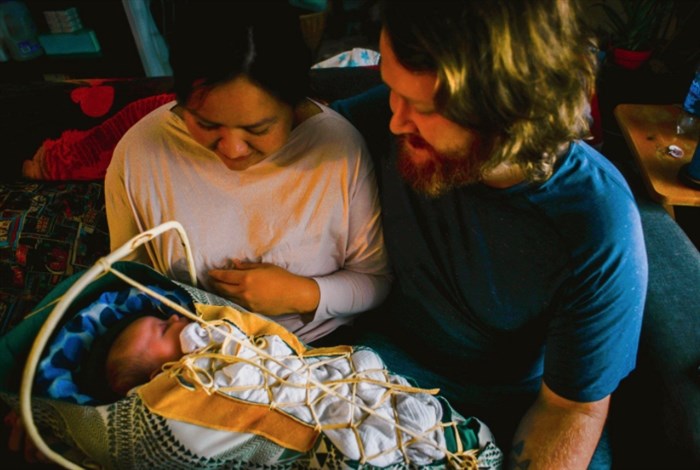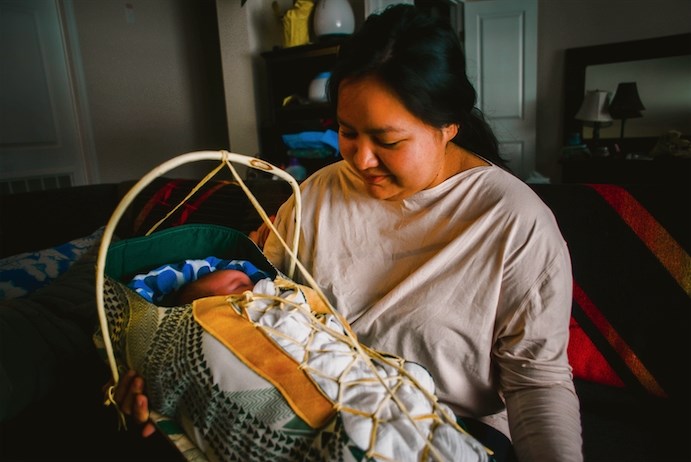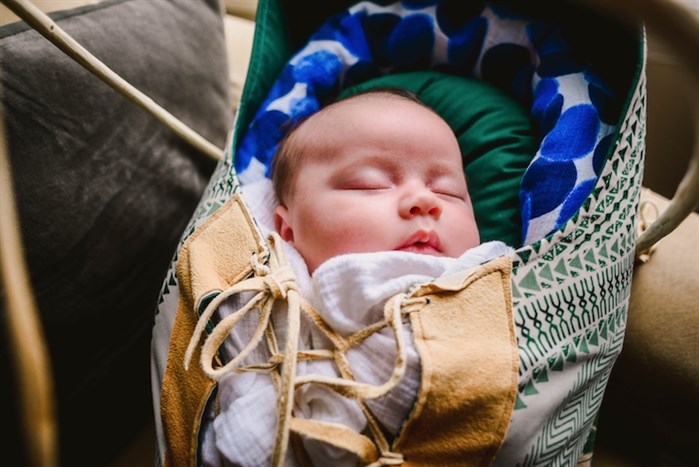
Sarah Alexis and Brian Muselle welcome their first child through ceremony.
Image Credit: Kelsie Kilawna, Local Journalism Initiative
November 24, 2020 - 5:30 AM
As soon as Sara Alexis and Brian Muselle found out they were expecting they “both cried for a few days,” says Alexis.
“We had wanted to expand our family beyond us and our dog for so long.”
Alexis is Syilx and Carrier, and Muselle, a non-Indigenous man, lives in Alexis’ home community on the Okanagan Indian Band.
After finding out the news, the couple jumped into preparing for the new arrival. Right away, Muselle, a beginner speaker, enrolled in further Nsyilxcn, Syilx language, classes.
“I wanted to be as respectful as possible, and I wanted to make sure that our little one grew up with her culture as much as possible and provide that opportunity,” says Muselle. Alexis is an intermediate Nsyilxcen speaker.
A big part of any parents’ journey is choosing a name for their child, but in Syilx culture, this process is especially important. According to Syilx C’aptikwl (oral stories), names carry purpose and responsibility, they outline one’s life work through the name given by Kwulencuten (Creator).
“There’s a deep spiritual connection too, our names tie us to the physical landscape or timxw (life force),” Alexis adds.
How Her Name Came to Be

First time mother, Sarah Alexis, reflects on the power and strength it takes to enter this part of life.
Image Credit: Kelsie Kilawna, Local Journalism Initiative
First time mother, Sarah Alexis, reflects on the power and strength it takes to enter this part of life. Photo by Kelsie Kilawna.
As an overcast sky shines dim into the living room bay window of their new home, Alexis speaks about how their daughter’s names came to be.
“I don’t think we picked her name,” she says. When Alexis was six months pregnant, their newborn presented her name to them for the first time in a dream, she says.
“I had this very vivid dream about being in labour and it was very similar to what labour felt like,” she explains. “It had to do with a spider talking to me, I remember it so vividly whispering. I remember in my dream I was trying to listen but I didn’t know how.”
She remembers finding spiders throughout her pregnancy, multiple times a day, so she told her husband “‘I think it has something to do with her name,’” she says.
“Her name was really there the whole time and we had to uncover what it was.”
The name that revealed itself to them was ‘Stemaliaica,’ which translates to ‘Daddy Long Leg Blanket.’
Alexis believes that the spider “has to do with the tiny Timxw [life force]. It has to do with the ones that people don’t generally think about, or don’t generally care about, or are freaked out about. I think that’s just one angle of it” she explains.
While spiders have special significance for Alexis, she says it’s the responsibility of each person to find their purpose of coming into the world with the name they brought.
Naming ceremony

Stemaliaica was welcomed to the world through ceremony.
Image Credit: Kelsie Kilawna, Local Journalism Initiative
Once Alexis and Muselle knew their daughter's name, they presented it to their family through a naming ceremony in the Kekuli, an underground pit house used often as a winter dwelling.
“It’s the first time where everyone else will know her name and get to greet her by that name,” explains Alexis.
Stemaliaica was welcomed to the world through ceremony. Photo by Kelsie Kilawna.
Having a traditional naming ceremony was important to her, Muselle, and her family because “we all see the value in the name for the newborns,” she says.
Alexis and Muselle want their daughter to “grow up in the language,”
“To grow up with her parents and grandparents, in the community, to be involved in and around the good work that happens,” Alexis says.
— This story on reproductive health access, originally published in The Discourse, was made possible in part with funding from First Nations Health Authority and Thunderbird Partnership Foundation. Their support does not imply endorsement of or influence over the content produced.
News from © iNFOnews, 2020